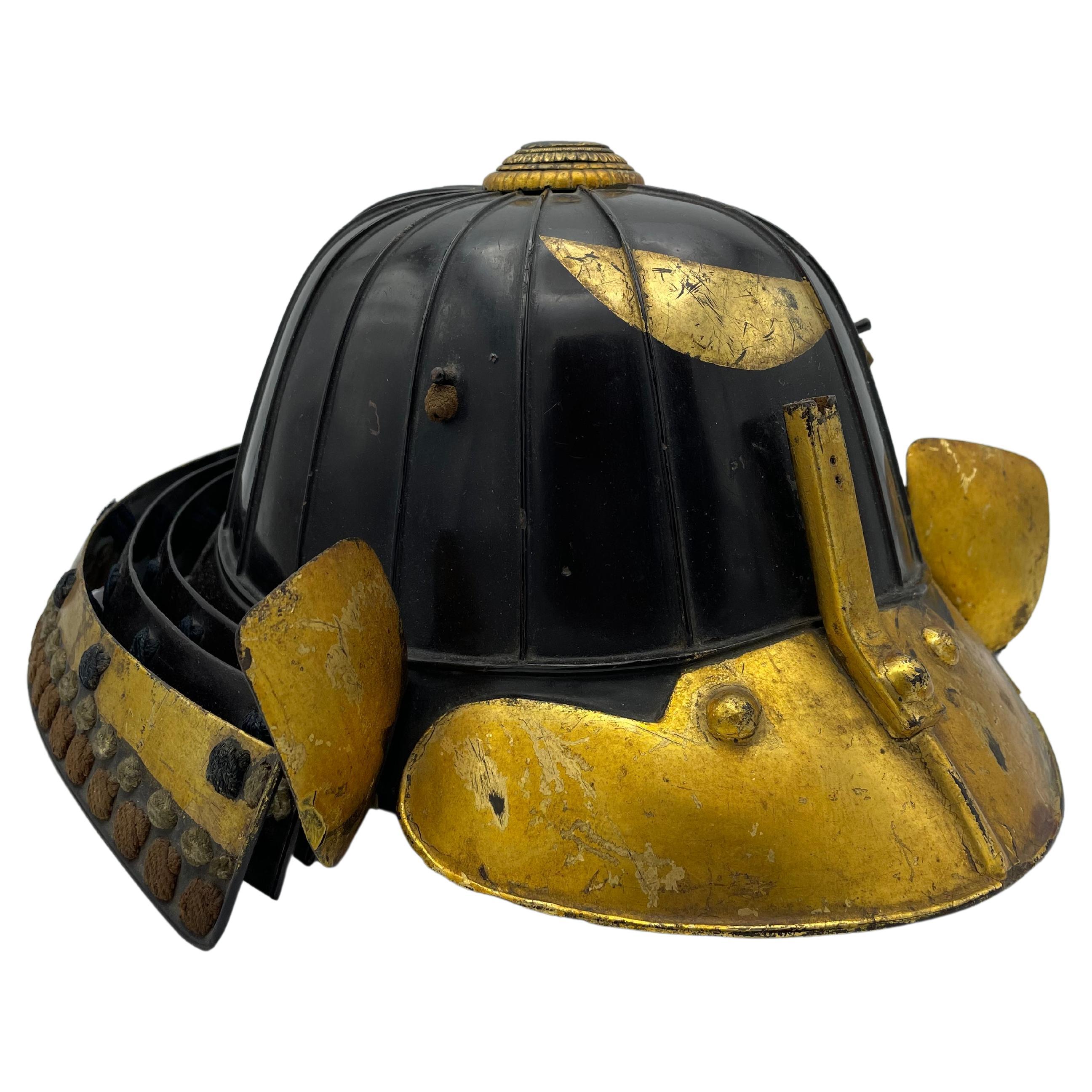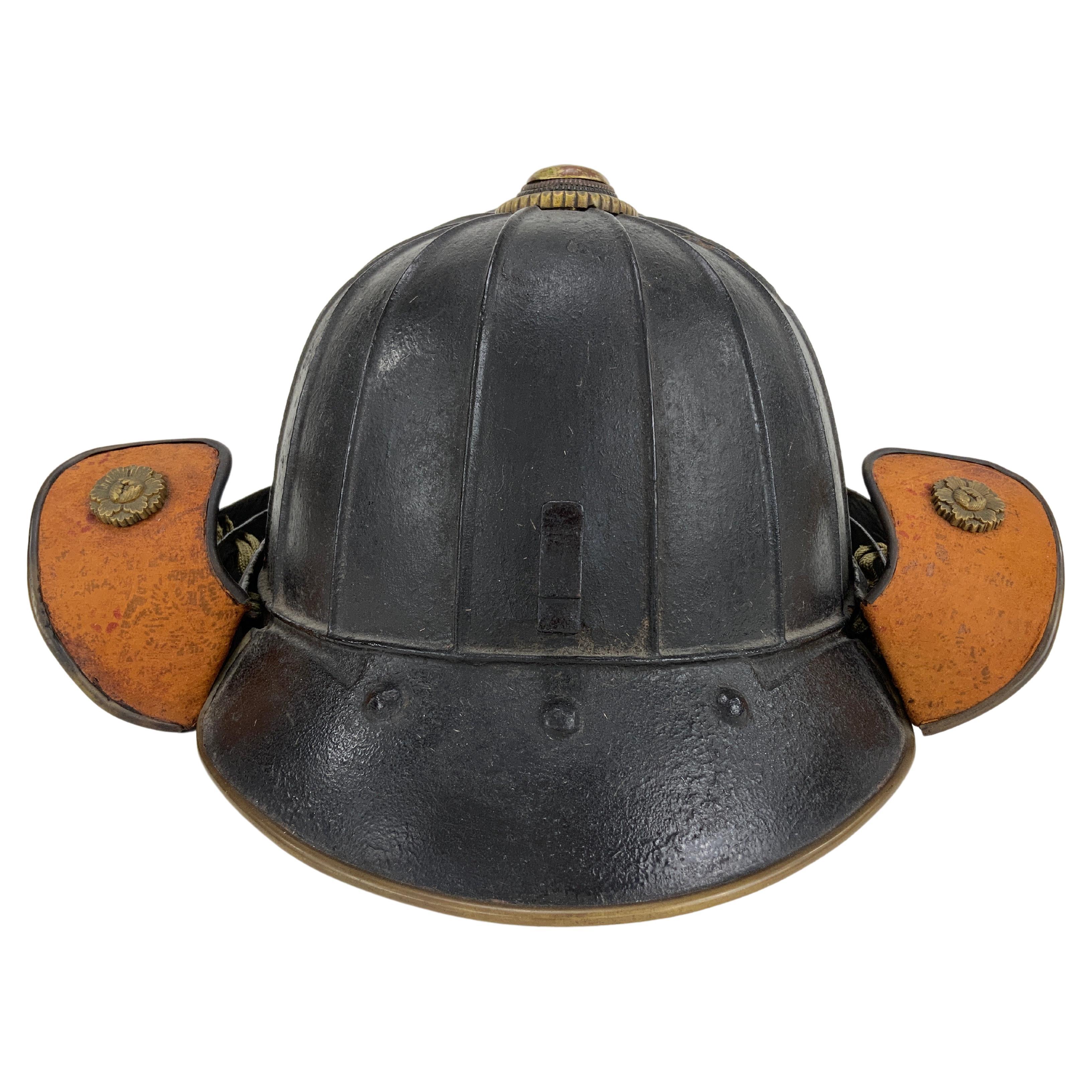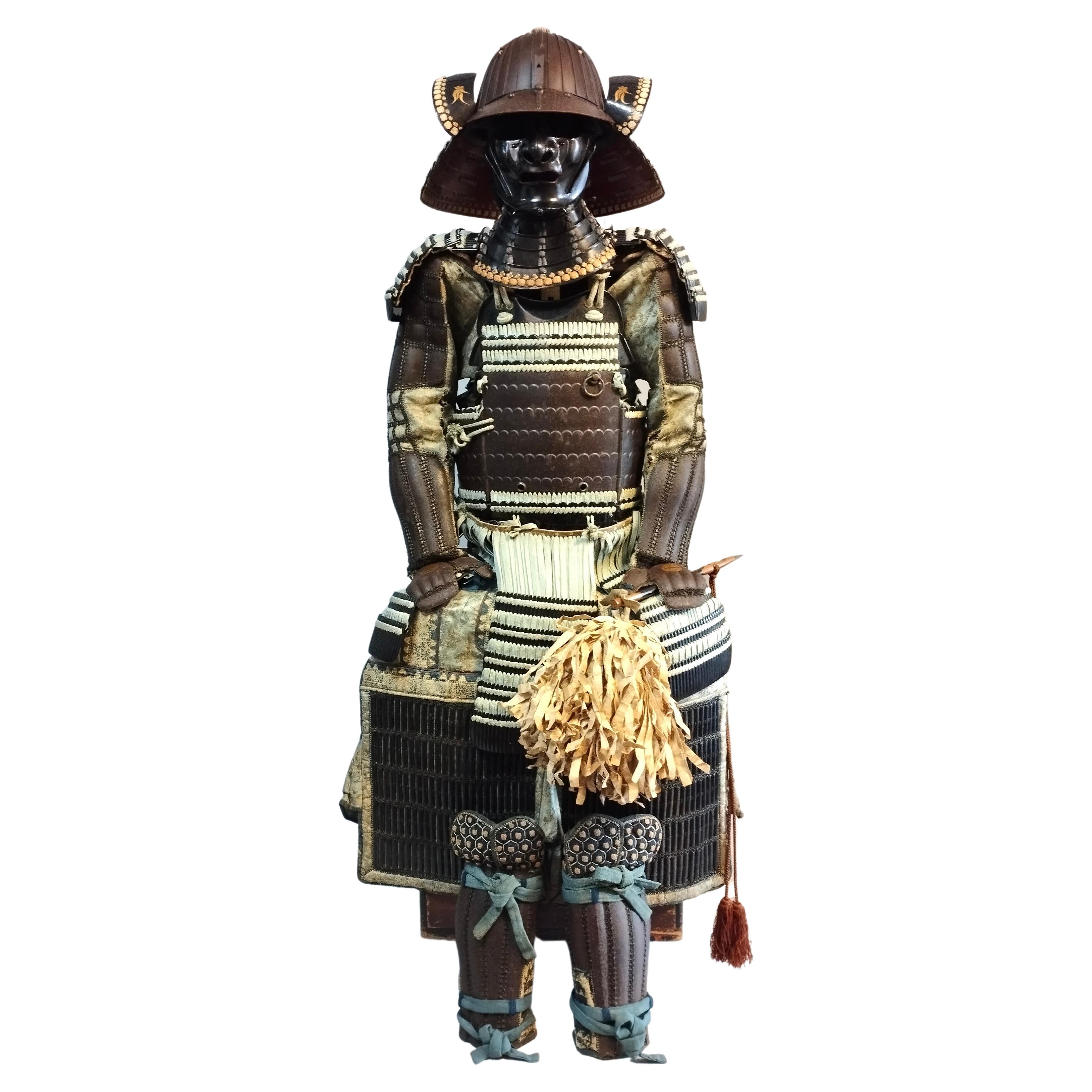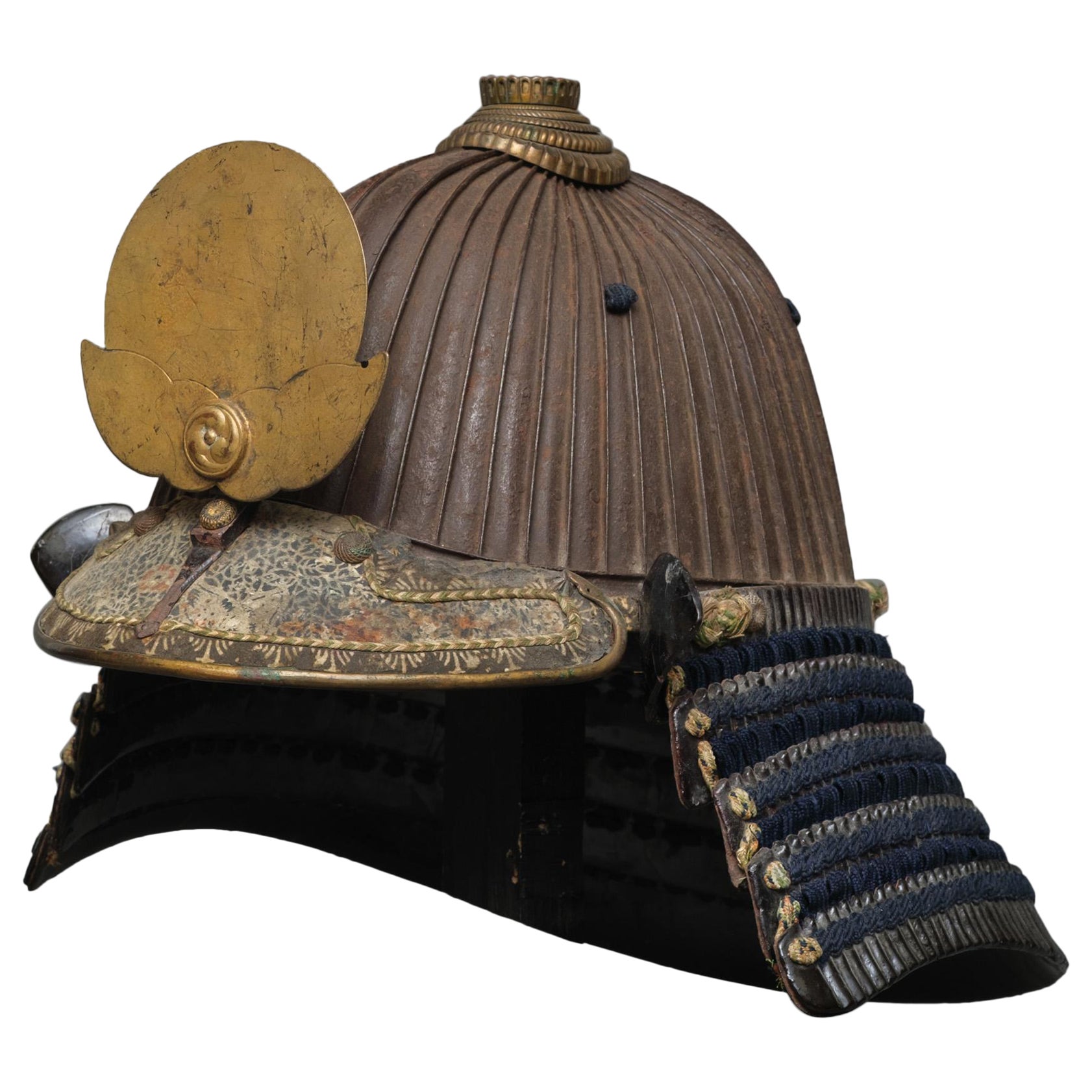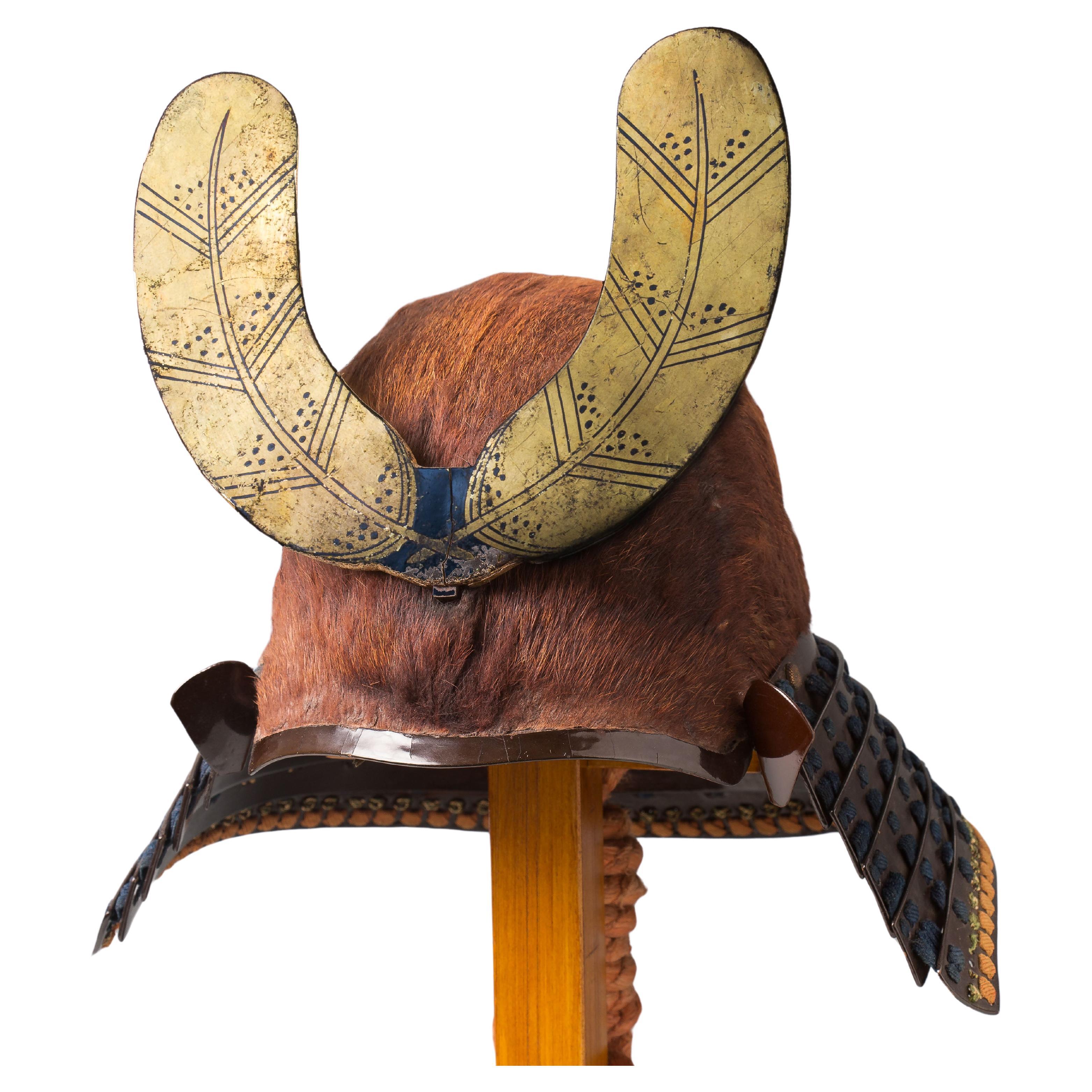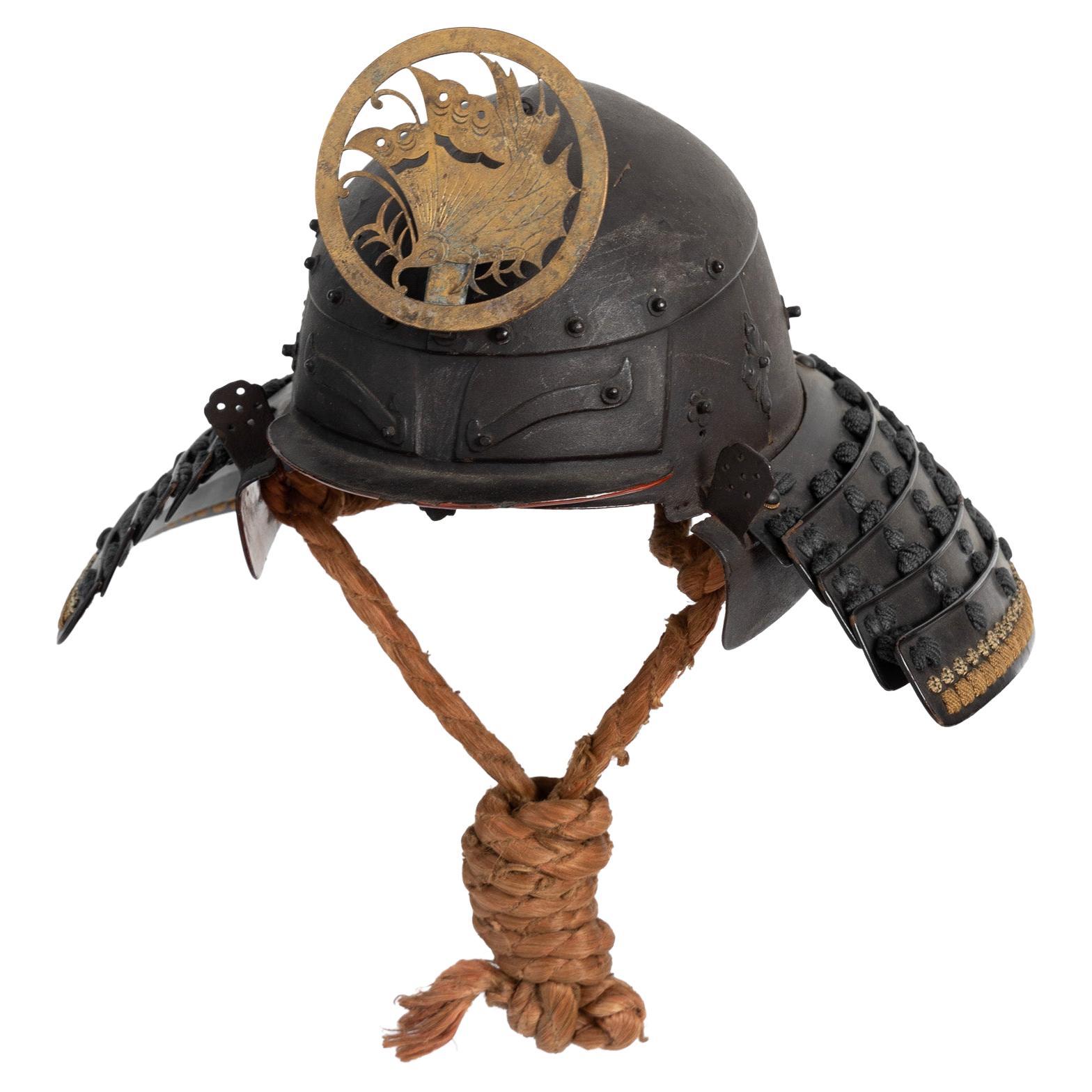Items Similar to Samurai Helmet "Zunari Kabuto" - Early Edo (circa 1610)
Video Loading
Want more images or videos?
Request additional images or videos from the seller
1 of 10
Samurai Helmet "Zunari Kabuto" - Early Edo (circa 1610)
About the Item
Samurai Helmet "Zunari kabuto" with 3 black lacquered iron plates.
Japan, early EDO period, circa 1610.
Neck protector (shikoro), 5-strip hineno, laced brown, beige and green.
Central ornament (maedate) in gold and silver lacquered wood. Triple tomo with 2 maple leaves. 2 rounded horn-shaped side ornaments (wakidate) in black and gold lacquered wood.
Black-lacquered iron mask (menpo), gray horsehair moustache, red-lacquered interior. Throat guard.
Damage and missing parts.
A true testament to history, culture and warrior tradition, this Kabuto, over 400 years old, imposing fear and respect, is a unique historical treasure. The strict samurai school begins at age 3, where students learn to overcome fear and suffering and acquire total impassivity. From the age of 8, apprentice warriors witness executions and carry the heads of the slain. When we talk about fear and respect, we are not joking.
Having said this, it is also a very decorative object.
- Dimensions:Height: 25.99 in (66 cm)Width: 13.78 in (35 cm)Depth: 13.78 in (35 cm)
- Style:Edo (Of the Period)
- Materials and Techniques:
- Place of Origin:
- Period:Early 17th Century
- Date of Manufacture:Circa 1610
- Condition:Minor losses.
- Seller Location:Paris, FR
- Reference Number:
About the Seller
New to 1stDibs
Joined in the past six months.
No Reviews Yet
Vetted Seller
These experienced sellers undergo a comprehensive evaluation by our team of in-house experts.
1stDibs seller since 2024
Typical response time: 1 hour
- ShippingRetrieving quote...Ships From: Paris, France
- Return PolicyA return for this item may be initiated within 14 days of delivery.
More From This SellerView All
- Japanese Folding Screen "Byobu" from the Edo PeriodLocated in Paris, FRJapanese Screen "Byobu", from the Edo period (circa 1800), with two leaves in silk paper mounted on canvas with leather background. Beautiful floral decoration "Rimpa" with wading bi...Category
Antique Early 19th Century Japanese Edo Paintings and Screens
MaterialsCanvas, Paper
- Alexander Calder - Three Onions - Signed Artist's proof on vellum, 1965.By Alexander CalderLocated in Paris, FRAlexander Calder - "Three Onions" Artist's proof on vellum, 1965, signed lower right. Original frame. H: 51 x W 71 cm. The American artist Alexander Calder was very attached to Fran...Category
Vintage 1960s French Modern Prints
MaterialsPaper
- Albrecht Dürer - Saint EustaceBy Albrecht DürerLocated in Paris, FRAlbrecht Dürer, Saint Eustace. Wood engraving, 1501. Signed with the monogram A.D (Albrecht Dürer) Why not having on a wall a Masterpiece which is also a part of History? Marie-Anto...Category
Antique 16th Century German Renaissance Prints
MaterialsPaper
- Dancing Ballerina Art Deco Sculpture by Ghanu GantcheffBy Ghanu GantcheffLocated in Paris, FRDancing Ballerina - Art Deco Sculpture by Ghanu Gantcheff Bronze mounted on Portor marble, Triple platinum. Old cast iron. Signed on the dress Getekend D.H “Ganu” Gantcheff, 1931 Dim...Category
Vintage 1930s French Art Deco Figurative Sculptures
MaterialsMarble, Bronze
- Pierre Paulin - Concorde F780 Lounge Chairs with their tableBy Pierre PaulinLocated in Paris, FRVintage pair of lounge chairs, model F780 called Concorde, with their original table by Pierre Paulin (1966). Each armchair: width 56 cm, depth 76, seat height: 33 cm. Very good cond...Category
Vintage 1960s French Space Age Lounge Chairs
MaterialsIron
- Malick Sidibé - The Sarakolé Family - Signed printBy Malick SidibeLocated in Paris, FRMalick Sidibé, "The Sarakolé Family", shot in 1969, printed and signed in 2006. Silver print, baryta paper. Framed. Malick Sidibé (1936-2016) is today considered one of the greatest...Category
Early 2000s Malian Photography
MaterialsPaper
You May Also Like
- Japanese Antique Combat Helmet 'Kabuto' 1800s Edo EraLocated in Paris, FRThis is an antique combat helmet made around 1800s in Edo era in Japan. Kabuto is a type of helmet first used by ancient Japanese warriors which, in later periods, became an important part of the traditional Japanese armour...Category
Antique Early 19th Century Japanese Antiquities
MaterialsIron
- Japanese Samurai Helmet Kabuto Edo Period (1603-1867)Located in Hampstead, QCA Japanese Samurai black-lacquered helmet (kabuto) in suji bachi style and of a goshozan shape consisting of the: - main dome (hachi) made from 16 plates in natural iron riveted to...Category
Antique Early 19th Century Japanese Edo Metalwork
MaterialsIron
- 18th Century Hirate Clan Samurai Armor with Signed Kabuto HelmetLocated in Fukuoka, JPThis is a truly exceptional set of 18th century Samurai armor that is sure to impress any collector or enthusiast. The patinated iron used in its construction has aged beautifully, giving the armor a truly unique appearance that is sure to catch the eye. The brocade silk and cotton padding used to line the armor not only provide a comfortable fit for the wearer, but also add an extra layer of decorative flair. One of the most striking features of this armor is the crests of the Hirate samurai clan that adorn it. These crests are a symbol of the clan's identity and heritage, and their presence on the armor speaks to the deep connection between samurai warriors and the clans they belonged to. The Kabuto...Category
Antique 18th Century Japanese Antiquities
MaterialsIron
- Signed Japanese Edo suji’bachi kabuto (helmet) with a moon & cloud maedateLocated in Amsterdam, NLAn antique, outstanding signed suji’bachi kabuto (helmet with ridges) surmounted by a gilt metal maedate (forecrest) shaped like a full moon emerging from the clouds heightened by a ...Category
Antique Early 19th Century Japanese Antiquities
MaterialsMetal, Iron
- Sogonari Kabuto Samurai Helmet Shaped as a Human Head Early Edo PeriodLocated in Milano, ITSogonari Kabuto Samurai Helmet shaped as a Human Head Early Edo Period (1615 - 1867). Three-plates kawari kabuto covered with tawny hair to ...Category
Antique Early 1700s Metalwork
MaterialsFur
- Okitenugui Kabuto Samurai Helmet Shaped as a Head Towel Saika, Early Edo PeriodLocated in Milano, ITOkitenugui kabuto Samurai helmet shaped as a head towel Saika, early Edo period, 17th century The Haruta armorers who moved to Kii province in the early 17th century, took the name from the village where they worked, Saika, near Wakayama, possibly on request of the local daimyo, Asano Yukinaga, a great armour amateur. Specialised in the construction of plate helmets, they produced mainly two typologies of kabuto: one with six plates covered with a chrysanthemum-shaped plate on top and one shaped as a “head towel”, called okitenugui. The latter type of kabuto employs very heavy plates crafted in a curved manner and was improved in order to make it resistant to firearms. This okitenugui kabuto features some distinctive decorations of the Haruta school, including the application of cut-out iron elements, including eyebrows, washers and lozenge-shaped decorations on the sides. The ring on the top, however, is a rare feature and could be used to hold a small war flag.Category
Antique 17th Century Metalwork
MaterialsIron
Recently Viewed
View AllMore Ways To Browse
Silk Road Figurines
Yama Wood Furniture
Germany Brass Chandelier
Long Runner Rug Wool
Lounge Chair Ottoman
Flower Gold Plate
Sculptural Aluminum
Belgian Chair Nouveau
Table Brass Foot
Light Green Glass Chandelier
Pair White Wall Sconce
Set Metal Sconces
Brass Sculptural Dining Base
Marble Top Coffee Table Italy
Must Chair
Unique Green Lamp
Three Seat Sofa Midcentury
Transitional Band
